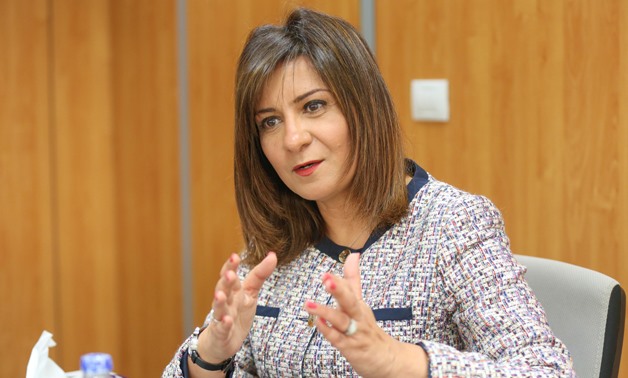
Egypt’s Minister of Immigration Nabila Makram conducts an interview with Egypt Today in an interview on Thursday, March 15, 2018, at the Magazine headquarters in Giza- Egypt Today/Karim Abdel Aziz
CAIRO - 15 March 2018: Some Egyptian expatriates, who are eligible to vote in the presidential election due to start on Thursday evening, may not be able to cast their ballots.
Expatriates’ national ID cards that bear the phrase “expatriate” instead of his/her residential address in Egypt cannot cast their ballots in the election, as per the regulations set by the National Election Authority (NEA), Egypt’s Minister of Immigration Nabila Makram told Egypt Today in an interview on Thursday.
“We have one problem with Egyptian expatriates’ participation in this election ... as you know, the required documents [to enable people to vote] must either be a valid digital passport, a valid ID card or an invalid ID card which bears an valid identification number.
"The problem is that a national ID card that bears [the term] ‘expatriate,’ means the holder no longer has the right to vote,” Makram said.
According to the NEA’s data, a total of 9,000 expatriates are ineligible to vote due to their unspecified residential addresses in Egypt, she said.
“However, our number is bigger [than this figure of 9,000],” she continued.
If any Egyptian national – above 18 years old – submits an application for an Egyptian ID card, he/she should submit a governmental receipt that bear his/her address in Egypt to a civil registry office. However Egyptian expatriates have no residency in Egypt, and thus their ID states “expatriate”.
Markam said that the solution to this problem boils down to conducting a legislative amendment to the Election Law, noting that a proposal to address this issue is currently being drafted in the House of Representatives. She said that the problem has emerged recently in Toronto, Canada, during the ministry’s campaign for electoral participation awareness.
No specific number of eligible voters abroad has been announced thus far. However, the number of registered Egyptian expatriates has reached ten million, according to data from the Central Agency for Public Mobilization and Statistics (CAPMAS), the Minister of Immigration said.
More than 313,000 expatriates voted in the 2014 presidential election; however, the voter turnout abroad is expected to increase in comparison to that during the 2014 presidential election, Makram added.
The Minister of Immigration has established an operation room to follow up the election process, in cooperation with the Ministry of Foreign Affairs. The ministry also will cooperate with communities abroad.
In a few hours, Egyptian expatriates will cast their vote in 139 embassies and consulates across 129 countries according to the NEA data. Starting in New Zealand, Egyptian expatriates will choose between incumbent President Abdel Fatah al-Sisi and his only rival, Moussa Mostafa Moussa, al-Ghad party chairperson.
This is the third presidential election to be held since the January 25 Revolution in 2011; a run-off round, if needed, is scheduled to take place in April.
Who else is ineligible to vote?
Constitutionally, policemen and members of the Egyptian Armed Forces are not allowed to cast their vote, as long as they are currently serving the state.
All convicts are deprived from their right to vote in the presidential election. In addition, the mentally challenged are ineligible to vote, according to the NEA rules.
Egyptian expatriates in the war-stricken countries of Syria, Libya, Yemen and Somalia will be unable to vote in the presidential election, owing to the lack of diplomatic offices in said countries.


Comments
Leave a Comment